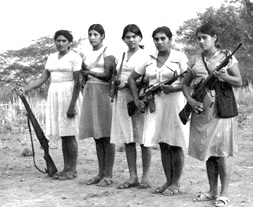
“We were about eight hundred people in a column, heading to the refugee camp shelter in Honduras. We were leaving everything behind, fleeing the Salvadoran army, during the civil war in El Salvador in the 1980s. We had to open the route. We walked only at night to avoid being discovered by the government army.
“The solidarity of the Honduran people was important upon our arrival at the camp,” E recalled during her visit to the refugee camp in Colomoncagua, Honduras.
“This was a very great experience in the struggle to end the repression of those years in El Salvador. We learned to organize ourselves in committees and to function collectively,” E continued. She was formerly a combatant of the FMLN and is now a comrade of the International Communist Workers’ Party.
We lived approximately nine years in that refugee camp. There we worked based on needs, not for a salary. Then we returned to El Salvador to join the revolutionary struggle, because the conflict had not ended.
Women have been key throughout the history of the class struggle. They have been part of the organizations of struggle and of the armed struggle for a better life for the working class.
Read our pamphlet: The Communist Fight Against Sexism here
A level of organization was reached that allowed the functioning of thousands of families in a collective life. As the needs arose, families were distributed in four collectives.
Many women stood out by giving leadership in the organization. They led the work of different groups. They did not limit themselves to domestic chores.
The first group consisted of four people who were in charge of informing and preparing people politically and ideologically to have good leadership.
The second collective was formed of one leader for each camp. They gave important information to the population.
The third group was also made up of one leader for each camp colonia (neighborhood). They were responsible for following up on the problems and needs that were presented.
The fourth group was likewise one for each neighborhood. They worked to solve the needs of clothing, food, security, sanitation, workshops, nutrition, and education.
Camp security was based on two women or two men doing two-hour shifts guarding the camp so that there were no infiltrations by the Honduran or Salvadoran army, and so on. The shifts were made from six in the evening until six in the morning.
The needs of the people, such as: if they needed food, clothing, or if their houses had faults, they made them known to the housing manager. This person was in charge of solving their problem.
Always with the support of the other groups, work was done and the needs that existed were met.
There was also a reception committee made up of five people who received delegations from different countries, such as the United States, Germany, Canada, Spain, Belgium, Ireland, Honduras. We worked to publicize what was being done and worked on in the camp. We informed them why we left El Salvador. We requested international support, either outside or inside the country.
“Now that I am in ICWP fighting for a society without money and free of gender discrimination, I understand this very well, and I know that it is possible,” E concluded.

